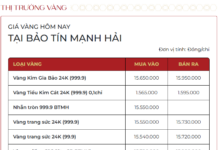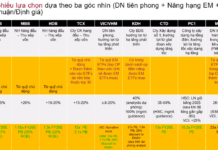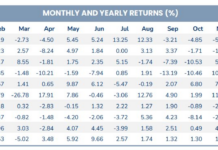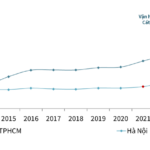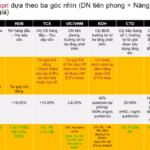White Pheasant Case Causes a Stir
A recent case involving Mr. Thai Khac Thanh (DOB 1980, from Do Luong, Nghe An) has caught the public eye. The Hung Yen Provincial People’s Court sentenced him to six years in prison for trading the white pheasant, a rare bird species. This case has sparked legal discussions and raised awareness about the illegal wildlife trade.
The white pheasant (Lophura nycthemera) is a protected bird species under the Ministry of Agriculture and Environment’s Circular 27/2025/TT-BNNMT, categorized as restricted for commercial exploitation and utilization (IIB). Breeding, propagation, or trading of this species requires a legal permit.
Group IIB includes six other rare pheasant species: the white-throated pheasant, chestnut-breasted pheasant, red-throated pheasant, black-throated pheasant, and purple-winged pheasant, along with two duck species: the black-headed duck and sharp-tailed duck.
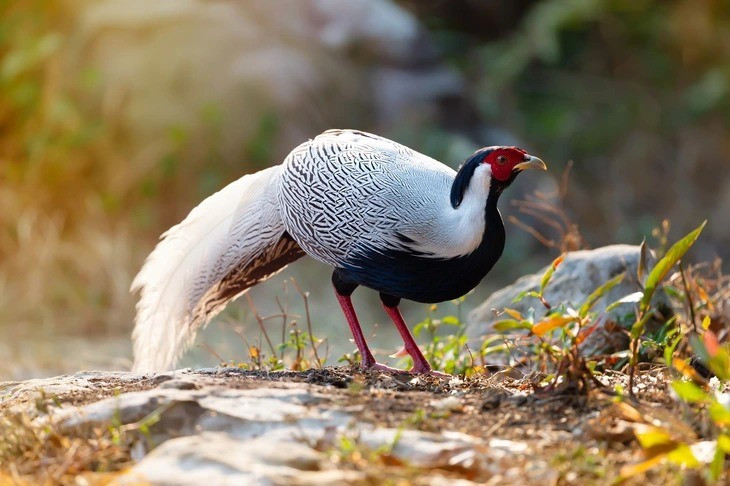
White Pheasant. Photo: Vinwonder.
According to regulations, breeding these species is permitted only for conservation, research, or eco-tourism purposes at certified conservation facilities, with strict conditions regarding origin, quantity, enclosures, and personnel. The law takes a hard line against any actions that harm biodiversity, especially the trade of rare and endangered wildlife.
Mr. Thai Khac Thanh’s sentence of six years in prison for trading the white pheasant has attracted significant public attention. On August 13, the Chief Prosecutor of Hung Yen Province filed an objection to the entire first-instance verdict, requesting further investigation. Mr. Thai has been released pending trial.
The “Underground Market” on Social Media
The current situation of wildlife trading on social media platforms, especially Facebook and Zalo, has become a severe issue, endangering the survival of rare species and damaging the ecosystem.
Simply typing keywords such as “buy rare birds,” “forest pets,” “white pheasant,” or “buy and sell forest animals” on social media yields numerous secret groups and personal pages advertising the illegal trade of wildlife.
Within these secret groups, advertisements for buying and selling wildlife are frequently posted. The traded species include forest animals, turtles, birds, musk civets, wild cats, and products like bear paws and pangolin scales, with prices ranging from a few million to tens of millions of dong. Sellers typically post attractive photos and videos, conduct private message transactions, accept online payments, and promise delivery even to distant locations.
In the group “Hội Mua Bán Các Loại Thú Rừng” (Forest Animal Trading Club), one account offers wild cats for 3 million dong each, while another buys various forest animals in any quantity. In the group “Thị Trường Thú Rừng” (Wildlife Market), an account sells musk civets for 5 million dong each, wild boar meat for 500,000 dong per kilogram, delivered by passenger bus, bear paws for 3 million dong, and pangolin scales for 500,000 to 1 million dong per kilogram.
Among the traded forest animals are species listed as endangered, rare, and protected. Despite knowing that these actions are illegal, sellers believe they can evade detection by disguising the transportation of the animals.
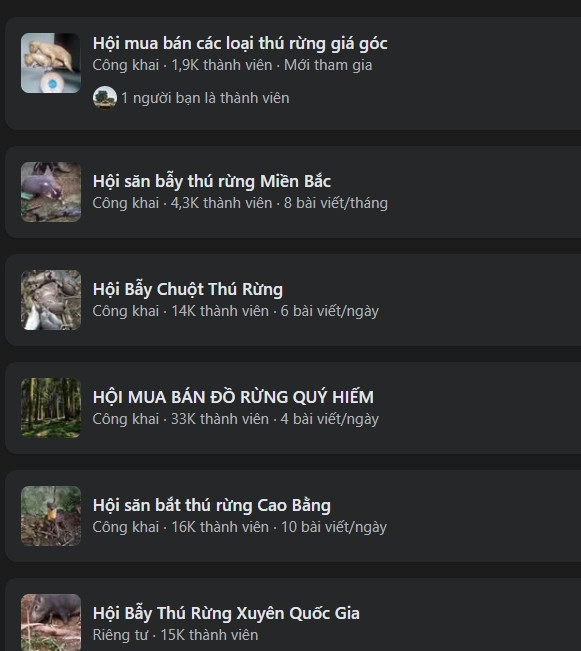
A simple keyword search on social media reveals numerous secret groups engaged in the illegal wildlife trade.
According to the Vietnam National Environmental Education Center (VNEEP), in 2024, the community reported over 1,900 cases of violations, including many online offenses. Commonly traded species included monkeys, turtles, wild birds, ivory, rhino horns, and tiger claws. These activities occurred on personal pages, in secret groups, and even on some e-commerce platforms.
In 2024, VNEEP recorded more than 200,000 individual animals and related products being advertised on these platforms. The authorities initiated criminal proceedings in 180 cases, successfully prosecuting 166 of them (92.2%).
Since the beginning of this year, VNEEP has campaigned against online wildlife trade violations. Within just three months, they collaborated with the community to shut down ten large wildlife trading groups on Facebook, with over 101,000 members, preventing hundreds of thousands of accounts from accessing these groups. Facebook was identified as the platform with the most violations, accounting for over 95% of all online wildlife trade offenses.
According to the Forestry and Forest Rangers Department, the current legal framework is stringent and carries significant penalties. However, to effectively combat this issue, it is crucial for people to raise their awareness, refrain from engaging in or facilitating the illegal wildlife trade, and actively report any violations to the authorities. This is the only way to protect these rare species from the threat of extinction in the wild.
“Police Raid Livestream Studios: Uncovering a $500,000 Counterfeit Goods Operation with 20+ Smartphones Streaming 24/7”
With the power of big data analytics, Chinese authorities have successfully cracked down on a syndicate peddling counterfeit mobile phone chargers through live streaming on social media platforms.
The Three Cups that Changed KATINAT’s Destiny: From Obscurity to the Most Famous Cafe Chain on Social Media, Surviving a Boycott Scandal to Become the Hunted.
Hitting the right note with young customers, Katinat overcame what seemed like a devastating ‘boycott scandal’ during the Yagi storm.
“Internal Messages Leaked: 18-Year-Old Fried Chicken Chain in Vietnam Accused of Serving Leftover Food”
Papas’ Chicken temporarily halts operations at its Hoang Van Thu branch in Tan Binh District, Ho Chi Minh City, as the fast-food chain’s management launches an investigation into a reported product quality issue. The popular fried chicken restaurant has assured the public that it is taking immediate action to address the concern and will provide updates as the verification process unfolds.










